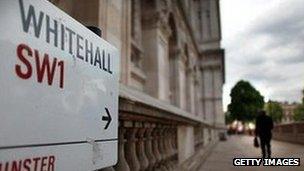Civil service job cuts will harm services, MPs warn
- Published

The committee foresaw "considerable risks to morale" in the civil service
Government departments cutting staff have failed to find new ways of working that do not threaten the provision of services, a committee of MPs has said.
The Commons Public Accounts Committee warned that staff numbers would therefore be likely to rise again after spending restrictions were lifted.
Conservative MP and committee member Richard Bacon called for a "fundamental redesign" in working practices.
But ministers said such plans were already being put in place.
A report by the committee entitled "managing early departures in central government" said the civil service had shed 35,000 jobs so far as a consequence of the 2010 Spending Review, but the Cabinet Office estimated that "half of the required headcount reduction is yet to come".
The civil service would probably need to increase its use of compulsory redundancies, the report added.
Senior civil servants had gone for "the easy, low-hanging fruit quickly", Mr Bacon explained in an interview with BBC Radio 4's Today programme.
Conservative MP Richard Bacon claimed that a "lot of people are employed in the wrong place"
'Real risk'
"There was probably a need to cut quite a lot of staff," he said.
"I think most people would accept that government had become somewhat bloated over the years and with the financial threat from the size of the deficit, there was obviously a need to do something and to do it quickly.
"There's now probably a second, more difficult phase - cutting further staff and making sure that it beds down so that it doesn't start to creep up again."
This could be achieved, he said, by "redesigning how work is done: not doing things that don't need to be done, working smarter, making it more normal to do things digitally - in other words on the internet - while at the same time protecting the people who don't have access to the internet".
Other departments could learn from the example the DVLA's facility allowing drivers to renew their tax discs online, Mr Bacon said.
He also praised HMRC's online services for "saving money and making it easier for taxpayers".
But the report said: "The widespread absence of new operating models, coupled with the pace and scale of the reductions, means that there is a real risk to departments' ability to deliver services."
'Ambitious'
The cost to date of making civil servants redundant as a consequence of the coalition's Spending Review had been "around £600m", the report added, estimating that this would "take between 11 and 15 months to recoup, after which departments will save around £400m per year".
Cabinet Office Minister Francis Maude predicted that savings due to staff cuts would be £630m per year.
"Overall our stronger controls on non-essential recruitment contributed to savings of nearly £1.5bn last year alone, when compared with the final year of the previous government," he said.
"To succeed in the future we need a more flexible Civil Service that is better able to deliver our ambitious programme to reform the public services on which we all rely.
"That is why we are embracing new ways of delivering services, doing more digitally, improving performance management, improving our management information and increasing accountability.
"Much of this was laid out in the Civil Service Reform Action plan we published in June and we will be making further announcements in due course."
- Published9 August 2012
- Published12 June 2012
- Published16 May 2012